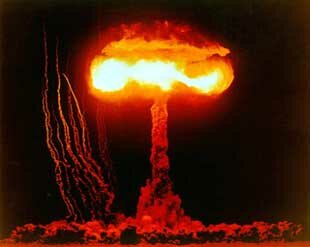|
News | Iran Travels | Iran Professional Services | About | Contact | Discussion Forum | Archive |
|
HAMSAYEH.NET |
| IRAN & INTERNATIONAL NEWS | CONTACT | ABOUT |
|
|
Another Summit Worthy of Technocrats | ||
|
|
|||
|
Obama’s Nuclear-Weapons Conference Fatally Flawed Before It Began.
by William Pfaff, April 14, 2010 Tribune Media Services, Inc.
The meeting on nuclear security convoked by Barack Obama this week was meant to prevent nuclear proliferation. This is a worthy cause, but – while I am writing before the meeting closes – I would assume that it will at best produce empty promises, as the meeting itself is fatally flawed. Its conceptual basis is that the United States is a disinterested world leader, calling on others to do what is self-evidently in the general interest. This is not true.
The underlying incitement to nuclear proliferation is the permanent veto exercised over Security Council decisions by the five nuclear-armed permanent members, a result of the Second World War and now widely considered unfair or outdated. It nonetheless is unlikely to change. The specific inspiration for weapons proliferation (or for countries to achieve "last-stage" status, which is to say a complete technological capacity to produce nuclear weapons, able to be activated if needed) is deterrence.
Japan is thought to possess last-stage status, and many think that this is the status Iran seeks. Israel is an (undeclared) major nuclear power and is determined to remain one. North Korea presents itself as a nuclear-weapons power, and may be one.
The most important force at work among vulnerable third-world states is the desire to have a nuclear deterrent against invasion or attack by the United States (or in the Iran case, Israel), or by some other nation in the future. Iran seeks to protect itself while reestablishing its regional influence. The claim that if it possessed nuclear weapons, it would aggressively attack Israel (or the U.S. or Europe) is mendacious propaganda, since nations, intelligent ones, such as Iran, are not given to committing suicide.
This threat is put about because Israel wishes the United States preemptively to demolish Iran as it already has demolished Iraq. One assumes that Barack Obama, also intelligent, will not do so, and his administration has already gone to great lengths to convince Israel not to attack Iran on its own.
At the very least, candidates for proliferation wish to create uncertainty about possession of a nuclear deterrent, even if it consists of a single weapon. (This is one interpretation of the situation of North Korea. Combined with the demonstrated recklessness of the North Korean leadership, it has placed North Korea in a strong enough position vis-à-vis its enemies that it has been able to blackmail them on certain issues.) As for the threat that President Obama described in calling this meeting, that terrorists would obtain nuclear weapons, this seems to me extremely unlikely, if only because no government possessing these weapons would imagine giving such power to terrorists, or allowing weapons to be stolen.
The world would hold them, not the terrorists, responsible for what followed, and they would themselves become the victim of retaliation. A different problem, complicated by the U.S. itself, might have found a solution at this meeting. Mr. Obama met separately with the leaders of Pakistan and India on Sunday, a day earlier than the plenary meeting. This was because the United States, during the George W. Bush administration, seemed to reward India’s secret introduction of nuclear weapons into South Asia. Pakistan had already followed India’s example, to have a deterrent ready to set against India’s new weapons. There was then, and remains, a Cold-War style balance of terror between the two countries.
Washington, under George W. Bush, granted a special nuclear relationship to India, promising to supply it with technology and fuel to build power plants. This represented a vast change from during the Cold War, when India – which had a "neutralist" policy – was viewed with hostility by the United States.
During this same period, Pakistan was a Cold-War ally of the United States, as it today remains an ally in the Afghanistan war, though influential members of the Pakistani elite had provided other countries with the means for nuclear proliferation.
Now American ally Pakistan is adding to its nuclear facilities so as to be in a position to construct second-generation weapons. When challenged, it replies that since the United States is giving civilian nuclear help to India, it is allowing India to use its existing facilities to build new weapons, which Pakistan must counter. Mr. Bush seems not to have thought about this when making India a new American ally.
It is not only dangerous but grotesque that India and Pakistan should be wasting their resources to enlarge the nuclear dimension in their lethal rivalry of more than 60 years, going back to Partition.
It is not only an unreasonable and quite unnecessary conflict, which steadily has generated wars and hatred, focusing upon the status of Kashmir (whose Hindu prince adhered to India at the time of Partition despite the fact that Kashmir’s population is Muslim). India sent troops to reinstall the prince and suppress the revolt of the Muslim population, subsequently refusing plebiscite and negotiation initiatives. Solving the Kashmir problem could be more of a benefit to peace than anything else that comes out of Mr. Obama’s conference.
|
Obama's nuclear summit shows that the United States is a disinterested nuclear state, calling on others to do what is self-evidently in the general interest.
|
||
Disclaimer: Opinions expressed on this site are solely Hamsayeh.Net’s own and do not represent any official institutions’, bodies’, organizations’ etc. Similarly, Hamsayeh.Net
would not be responsible for any other opinions that may be expressed therein by other sources through direct or indirect quotations.


